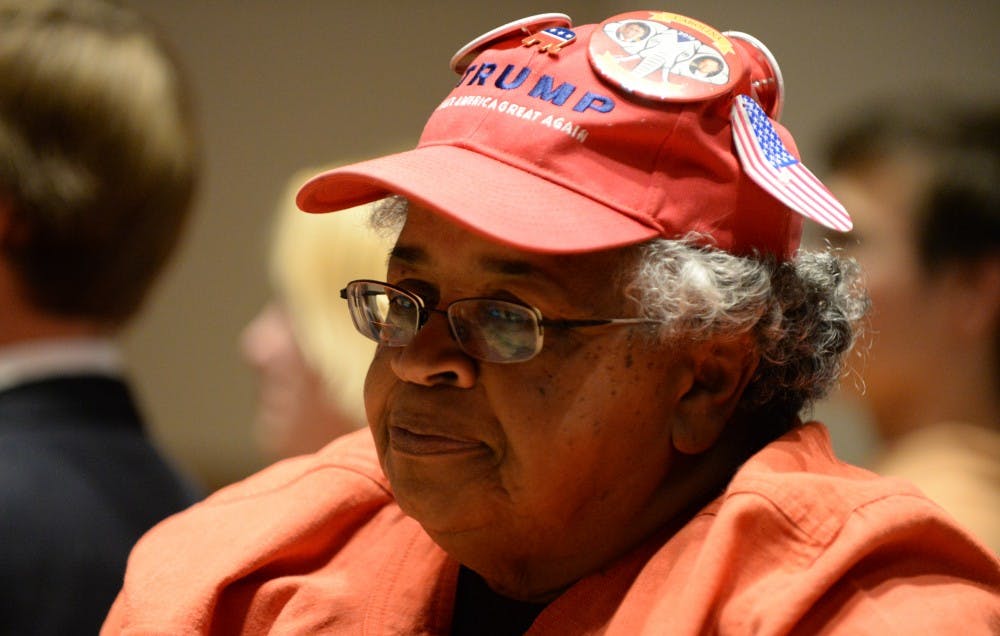Five members of Duke College Republicans have come out against Republican nominee Donald Trump, but the group as a whole has not taken a position one way or the other.
The Chronicle reported in August that the organization was “abstaining” from a position on Donald Trump’s controversial presidential campaign. At that time, Harvard University’s Republican Club had formally denounced the candidate, and Republicans on Yale University’s campus split into two groups—divided on what stance to take.
Explaining that decision, Colin Duffy, a junior and chair of DCR, previously noted that the group was choosing to focus on down-ballot races instead.
“The Duke College Republicans' members come from a diverse and wide array of opinions and backgrounds all along the conservative spectrum,” he wrote in an email. ”Our club has limited time resources, and North Carolina has highly competitive state and local elections this year. Therefore, DCR will be focusing the club's efforts and resources on the gubernatorial and senatorial races.”
Since then, Trump has been attacked for a 2005 video in which he brags about using his fame to grope women, which led prominent Republicans such as Arizona Sen. John McCain to withdraw endorsements. The chairwoman of the College Republican National Committee, Alex Smith, also denounced the candidate, tweeting she was “not with him.”
In early October, junior Rebecca Blair, seniors Adam Lemon and Maddy Bolger and sophomores Michelle Krogius and Paul Forrester called on Trump to exit the race. They urged voters not only to write in a presidential candidate instead, but also to support Republican Senator Richard Burr and Republican Governor Pat McCrory elsewhere on the ballot.
The entire organization, however, has not taken a definitive position on Trump and his campaign. Just as in August, the group is divided on its support for Trump, and Forrester emphasized DCR has not endorsed a presidential candidate this cycle.
“Republicans across the country have been divided about Trump’s candidacy. Our organization is no different,” Forrester wrote in an email. “Some members, like me, will not vote for Trump because he does not share our conservative values of limited government, free markets and a strong national defense. Others have made a ‘lesser of two evils’ calculation between Trump and Clinton and opted for Trump.”
Denouncing Trump now as an entire group might go against the compromise made at the beginning of the year, said Adam Lemon, a senior and former chair of DCR. Although Lemon is not a voting member, he said the vote on whether to denounce the candidate was a “close one.”
“There was a little bit of disagreement,” he said. “Mostly because people felt that an outright denunciation was not in the spirit of the original compromise we forged at the beginning of the semester, but some of us wanted to do something anyway, so that was the decision we made.”
Complicating things further might have been pressure from the North Carolina Federation of College Republicans, which he said is “very stringent” on local chapters denouncing the party’s nominee.
“The State Party did issue a directive saying they would not allow such things the weekend when the remarks were roiling the political world,” he said. “It was pretty much a very obvious ‘please stay out of this, the situation’s crazy enough as it is’ kind of message.”
Duffy confirmed this—adding that “chapters were only approved to reiterate statements on the issue published by the North Carolina College Republicans governing body.”
Forrester, however, pushed back on that notion, adding that the “NCFCR is a true federation,” meaning that they do not exert complete control over DCR's actions, and that DCR does not make its decisions based on NCFCR’s recommendation or lack thereof.
The North Carolina Federation of College Republicans could not be reached for comment.
Despite all the disagreements, Lemon said there was no risk of a split—like what happened at Yale—among DCR.
“It’s definitely not a 'Game of Thrones' scenario,” he said. “There’s a lot of disappointment in the nominee, and disappointment is a kind word, but it’s not remotely close to any sort of civil war.”
Get The Chronicle straight to your inbox
Signup for our weekly newsletter. Cancel at any time.

